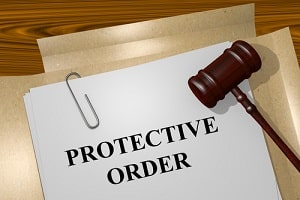What Are the Consequences of Being Issued an Order of Protection?

If you are accused of domestic violence, your accuser may decide to file for an order of protection against you. Should this happen, it is important to understand what the criminal consequences of the various protective orders are, what you can and cannot do because of them, and under what circumstances you can contest them. Domestic abuse is difficult, emotionally turbulent terrain, and if you are ever accused of such, you should contact an experienced domestic abuse lawyer immediately. With professional legal help, you may be able to protect your rights, lessen any charges, and receive or retain fair custody or visitation rights of any children you may have.
Orders of Protection in New York
Orders of protection can be issued by a Judge in a Family Court matter or a Judge in a Criminal prosecution. In a criminal prosecution, the court issues the order of protection against the defendant charged with committing a criminal offense. The parties may or may not be known to each other. In a Family Court matter, the parties must be known to each other and the order of protection can be filed from one person to another if their relationship is spousal, if they share a child, if they are related or married, or if their relationship can be qualified as “intimate.” In this case, intimate does not relate to sex, and can simply include a longstanding history.
In New York, there are several kinds of orders of protection, as explained here:
- Temporary Order of Protection: This type of order takes effect immediately but only lasts until the following court date. At that time, the order can either be extended or is nullified. This is to protect domestic abuse victims in the time before their alleged abuser’s formal conviction.
- Final Order of Protection: The order that is filed upon a conviction by plea or after a trial.
- Full Order of Protection: If you have a full order of protection filed against you, you must completely avoid the complainant, his or her home, workplace, and any relatives.
- Limited Order of Protection: This kind of order allows the accused to communicate with the complainant but forbids him or her from abusing, harassing, or threatening the alleged victim.
If you violate the terms of an order of protection and the police are called, you can be arrested. If the police are not called at the time of the violation, the complainant can still file a violation with the local police. Orders of protection can be revoked, prolongated, or their terms can be strengthened or weakened at any time by the issuing court. A person subject to an order of protection can have pending criminal and family orders of protection issued against them simultaneously. If the order of protection was filed through a criminal matter, the issuing judge can specify that the terms of the Criminal order will yield to a Family Court order that permits the parties to have limited contact solely for the purpose of complying with visitation or custody orders from the Family Court. Additionally, in Family Court, either party can try to persuade the court to revoke or modify the order if circumstances change, adjustments to child visitation rights can be made, or the restrictions need to be tightened if the abuser is persistent. The unique details of every domestic abuse case and the corresponding terms of any order of protection warrant a knowledgeable attorney to develop a thorough legal defense on your behalf if you are facing these serious accusations.
Contact a Bronx Domestic Violence Defense Lawyer
You cannot go through a domestic violence case on your own. In some situations, your alleged complainant may make false allegations against you. Make sure to defend your rights to the fullest extent with the help of a trustworthy Bronx County order of protection attorney. Contact The Law Firm of Gregory J. Watford, Esq., PLLC to work with an attorney with over 20 years of experience in the criminal justice system. Schedule your initial consultation by calling our Manhattan office today at 646-580-6675.
Source:
https://www1.nyc.gov/site/nypd/services/victim-services/resources-services-orders-protection.page

 646-580-6675
646-580-6675





